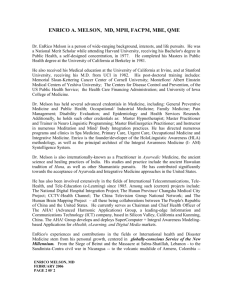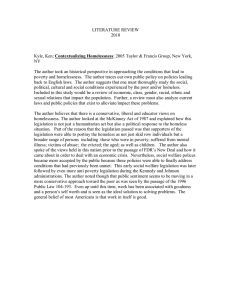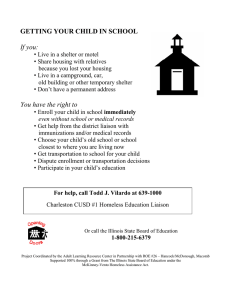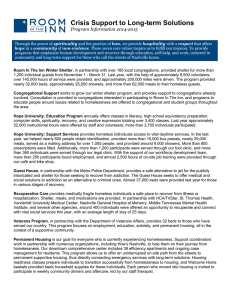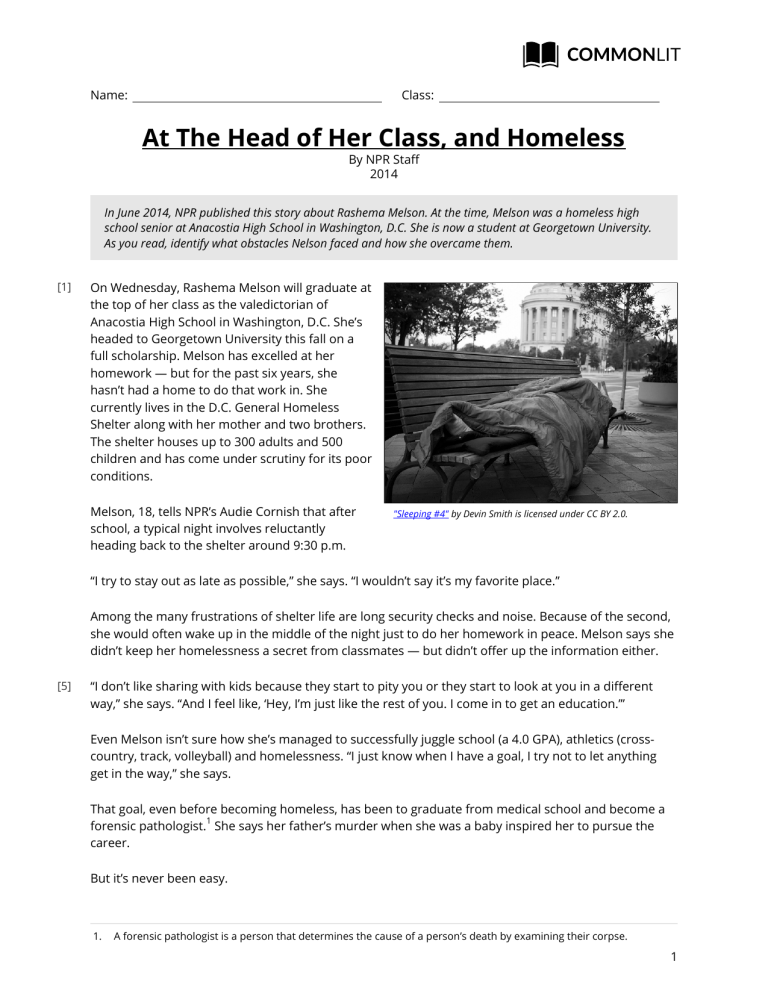
Name: Class: At The Head of Her Class, and Homeless By NPR Staff 2014 In June 2014, NPR published this story about Rashema Melson. At the time, Melson was a homeless high school senior at Anacostia High School in Washington, D.C. She is now a student at Georgetown University. As you read, identify what obstacles Nelson faced and how she overcame them. [1] On Wednesday, Rashema Melson will graduate at the top of her class as the valedictorian of Anacostia High School in Washington, D.C. She’s headed to Georgetown University this fall on a full scholarship. Melson has excelled at her homework — but for the past six years, she hasn’t had a home to do that work in. She currently lives in the D.C. General Homeless Shelter along with her mother and two brothers. The shelter houses up to 300 adults and 500 children and has come under scrutiny for its poor conditions. Melson, 18, tells NPR’s Audie Cornish that after school, a typical night involves reluctantly heading back to the shelter around 9:30 p.m. "Sleeping #4" by Devin Smith is licensed under CC BY 2.0. “I try to stay out as late as possible,” she says. “I wouldn’t say it’s my favorite place.” Among the many frustrations of shelter life are long security checks and noise. Because of the second, she would often wake up in the middle of the night just to do her homework in peace. Melson says she didn’t keep her homelessness a secret from classmates — but didn’t offer up the information either. [5] “I don’t like sharing with kids because they start to pity you or they start to look at you in a different way,” she says. “And I feel like, ‘Hey, I’m just like the rest of you. I come in to get an education.’” Even Melson isn’t sure how she’s managed to successfully juggle school (a 4.0 GPA), athletics (crosscountry, track, volleyball) and homelessness. “I just know when I have a goal, I try not to let anything get in the way,” she says. That goal, even before becoming homeless, has been to graduate from medical school and become a 1 forensic pathologist. She says her father’s murder when she was a baby inspired her to pursue the career. But it’s never been easy. 1. A forensic pathologist is a person that determines the cause of a person’s death by examining their corpse. 1 “Along the way, we stumbled and we started struggling as a family,” she says. [10] When those struggles began, she considered quitting sports and getting a job. But her coaches and teachers convinced her otherwise. “They were just like, ‘Don’t worry, you’re doing the best you can — keep it up, just do what you have to do,’” she says. “They were always there for me. They took a lot of stress from my mind.” But she says she still worries about what will happen to her family after she heads off to college in the fall, even if the campus is just a few miles away. She’s hopeful her younger brother, who’s 14 years old and a talented athlete, will continue to find a haven in sports. In the meantime, she has advice for other homeless kids: Don’t let your situation define you. “I would just say keep your head up because you never know what’s going to happen,” she says. “You just have to have hope and faith and don’t let it change who you are. Don’t become ashamed and don’t be embarrassed. And just know who you are inside. Just because you live in a shelter — that’s not who you are, that’s just where you reside at for the moment.” [15] She says it’s the best advice she can give; it’s what she tells herself. ©2014 National Public Radio, Inc. News report titled “At The Head Of Her Class, And Homeless” was originally broadcast on NPR’s All Things Considered on June 11, 2014, and is used with the permission of NPR. Any unauthorized duplication is strictly prohibited. 2 Text-Dependent Questions Directions: For the following questions, choose the best answer or respond in complete sentences. 1. Which of the following best identifies the central idea of the article? A. B. C. D. 2. unenthusiastically patiently surprisingly angrily PART B: Which of the following phrases from the text best supports the answer to Part A? A. B. C. D. 4. A homeless high school student is motivated to help support her fellow students get scholarships for college. The best way to succeed in school is to study hard in and out of the classroom. Scholarships should be given to homeless high school students who excel both in and out of the classroom. A high school student perseveres through the difficulties of homelessness and is awarded a full college scholarship. Part A: What does the word “reluctantly” most closely mean as it is used in paragraph [RI.4] 2? A. B. C. D. 3. [RI.2] “The shelter houses up to 300 adults and 500 children” (Paragraph 2) “I wouldn’t say it’s my favorite place.” (Paragraph 3) “she would often wake up in the middle of the night” (Paragraph 4) “Melson says she didn’t keep her homelessness a secret from classmates” (Paragraph 4) Which statement best describes Rashema Melson’s plans for college? A. B. C. D. [RI.1] [RI.3] Melson wishes that she could go to college, but she is instead planning on staying at home to support her family. Melson is attending a college that is far from home because she wants to try to forget about her rough childhood. Melson wants to go to college so that she can start a homeless shelter that is more helpful than the one where she lived. Melson is attending college with a scholarship and already has plans about what to do after graduating. 3 5. How does paragraph 14 contribute to the development of ideas in the article? [RI.5] 4 Discussion Questions Directions: Brainstorm your answers to the following questions in the space provided. Be prepared to share your original ideas in a class discussion. 1. In your opinion, what is the primary reason Rahema succeeded? Cite evidence in your answer. 2. Do you believe that our culture tends to expect more or less of people who are experiencing hardships? Why? 3. According to the National Alliance to End Homelessness, in January 2014, there were 578,424 people experiencing homelessness on any given night in America. Pretend you are a consultant to the National Alliance to End Homelessness. What is your proposal to reduce these numbers? 4. Why do you think Rashema was so driven to excel in school? In general, what is the goal of education? Cite evidence from this text, your own experience, and other literature, art, or history in your answer. 5

